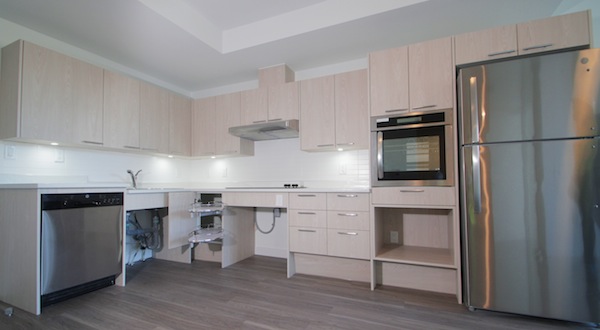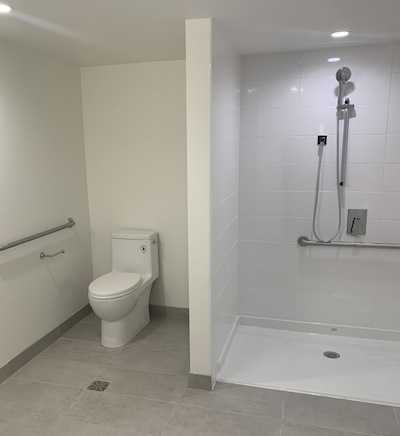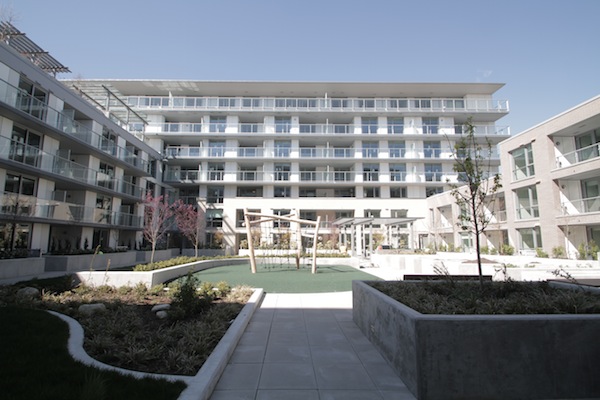Dogwood Gardens, which is due to open later this year, features an open garden space with shading that is set off from the street. (photo by Lior Noyman Productions)
In October last year, Tikva Housing Society, in conjunction with YMCA Metro Vancouver and the Association of Neighbourhood Houses, opened Kerrisdale’s newest affordable housing project at Arbutus Centre. Named xwƛ̓əpicən (pronounced “hook la’pitzen,” Musqueam for “the Hollow”), the 125-unit project is designed to meet a vital need in one of Vancouver’s most exclusive and high-priced residential areas: affordable housing that is also universally accessible to anyone with a disability.
“[The new project] includes nine adaptable units that are designed for people with mobility challenges who do not need a wheelchair or walker,” explained Anat Gogo, who serves as Tikva’s manager of programs and donor relations. The nonprofit finds creative ways to increase affordable housing, primarily for Jewish low- to moderate-income families and individuals.
Adaptable units mean that individuals who have accessibility needs are able to have the unit modified to meet their individual requirements, whether it’s grab bars in the hallway, structural adaptations that make it easier to cook or special lighting for low-vision needs. Many apartment buildings don’t allow tenants to make structural modifications, even to accommodate disabilities. By offering a limited number of adaptable units, fully accessible apartments can be reserved for individuals who require a wheelchair-adapted unit. Tikva manages five such rentals at the Arbutus property.

Projects like the one at Arbutus Centre are reflective of Tikva’s vision of affordable housing. “We are committed to fostering inclusive housing that serves all populations within the community,” said Gogo. It’s a mission that continues to adapt to the increasing demand for affordable housing in Greater Vancouver’s Jewish communities.
One of the drivers for finding new ways to increase accessible housing is Vancouver’s aging population, noted Gogo. “It’s important to recognize that our aging baby boomers will benefit from enhanced accessibility for those with mobility challenges.”
But it also benefits families and individuals of all ages who face barriers in their day-to-day living, she added. According to Statistics Canada (2017), more than six million Canadians live with one or more types of disability. Invisible disabilities are among the most frequent conditions noted, with housing options constricted by accessibility barriers, discrimination and employment limitations.

As a result, the B.C. Building Code now requires new and renovated buildings to be accessible to anyone with a disability, which includes “a person who has a loss, or a reduction, of functional ability and activity and includes a person in a wheelchair [or] a person with a sensory disability.” Adaptable housing that can be modified economically and at a later date is British Columbia’s newest technology to meeting that growing and variable demand.
According to Gogo, Tikva is exploring ways to ensure that accessible housing addresses all needs, including those associated with invisible disabilities, such as autism spectrum disorder, vision disorders, and autoimmune conditions like multiple sclerosis and rheumatoid arthritis. She said Tikva actively seeks partnerships with other organizations that can support that expanding effort. “We have a great partner in the Jewish Family Services that is open to this initiative,” she noted.
The society also regularly networks with builders to explore new ways of meeting that goal. She said improved designs include features like “well-ventilated spaces, soundproof walls, signage that makes all tenants and visitors to the building know that this is an inclusive building.” Tikva also holds workshops and training for staff to help them engage with residents and stakeholders in the community.
The demand for accessible housing has also created new funding incentives that in turn will increase the amount of inclusive housing on the market. “Canada Mortgage and Housing Corporation is responsible for delivering [Canada’s] National Housing Strategy,” Gogo explained. The program offers reduced financing rates for nonprofits and developers whose housing developments comprise at least 20% of fully accessible units or universal design throughout the project.
“We take advantage of opportunities to advocate to all levels of government for special features to be included in design requirements that would improve quality of life for residents, including push-button door openers for accessible suites and amenity rooms, grab bars in all bathrooms, and wheelchair access to all outdoor amenity spaces,” said Gogo.
And Tikva is exploring ways to address other types of invisible disabilities, such as those triggered by environmental conditions. Gogo said the housing society is in the process of retrofitting one of its older buildings and is actively participating in the design stages. “We’re still in the very early stages of this planning,” she said, “but all considerations are on the table to create a living environment that would benefit our tenants no matter what their medical condition may be.… More research and public education would help build the case for those with invisible disabilities. Inclusive communities are those that recognize the diversity of our population, and that everyone deserves to have access to services, recreation and civic engagement.”
At the present time, three of the six properties Tikva operates have accessible housing. Dogwood Gardens, on 59th Avenue in the Marpole community, is due to open later this year, managed in joint cooperation with SUCCESS. For more information about available rentals, go to tikvahousing.org.
Jan Lee is an award-winning editorial writer whose articles and op-eds have been published in B’nai B’rith Magazine, Voices of Conservative and Masorti Judaism and Baltimore Jewish Times, as well as a number of business, environmental and travel publications. Her blog can be found at multiculturaljew.polestarpassages.com.

